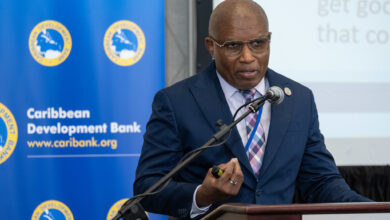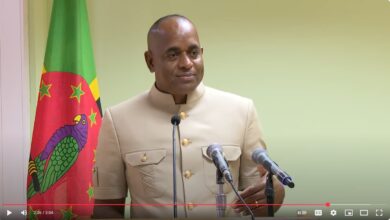Mr. Chairman, the CARICOM Single Market and Economy is an instrument conceived by Heads of Governments of the CARICOM Community to facilitate the economic development of the member states of CARICOM. As we have heard many times, and with which many of us can agree, the private sector is the driver of social and economic development, and welfare, in any modern society. Our ability to identify and exploit market opportunities is instrumental in creating jobs, and in affording many other-wise unemployed citizens the opportunity to earn a living. These, Mr Chair, I believe are two of the fundamental objectives of the CSME outlined in the Revised Treaty of Chaguaramas.
Paragraphs (A) and (B) of Article 6 speak to the improved standards of living and work, as well as the full employment of labour. Other objectives, such as sustained economic development; expansion of trade and economic relations with third states; enhanced levels of international competitiveness; and increased production and productivity all hinge on private sector development. However, Mr. Chair, private sector development within CARICOM rests on the full implementation of the CSME. It is therefore imperative that the CSME is made to work, and work well.
Mr. Chair, the Region’s private sector acknowledges the work currently being carried out in order to hasten the implementation process. One such undertaking is the CIDA-CARICOM Trade and Competitiveness Project. The Caribbean Association of industry and Commerce (CAIC) is a partner organization to this project, and having signed a Memorandum of Understanding with the CARICOM Secretariat, is playing our part in trying to hasten this CSME implementation. However, more work needs to be done by the CARICOM Secretariat and our Regional Heads of Government.
Mr. Chair, President of the Trinidad and Tobago Coalition of Services Industries, Mr. Lawrence Placide, spoke for all of us at the recently held Regional Symposium on Services in Antigua when he noted that the private sector is becoming disenchanted at the slow implementation of the CSME. Mr. Chair, the fact is, we have missed many of our deadlines for CSME implementation. The private sector is therefore calling for urgent attention and focus to be directed to those areas of implementation which must be addressed immediately.
Mr. Chair, we are also calling for the urgent implementation of the movement of capital. In the words of Mr. Douglas Orane, CEO of Grace Kennedy Limited, at CAIC’s 4th Annual Private Sector Meeting in June of this year, there is not enough capital in the Region to meet the aspirations of our people. Therefore, having free movement of capital in order to create economic development is in keeping with improving the standard of living of our people. The capital constraints of the private sector, and especially the services sector, also make it necessary for the CSME to facilitate the attraction of Foreign Direct Investment (FDI). We are confident that FDI will provide a beneficial boost to private sector development through capital inflows, technology transfer, as well as other benefits.
The private sector is again calling for the establishment of a Regional Stock Exchange and a regulatory framework in order to make the markets truly efficient to raise capital and function as one economic space. The Region should aggressively pursue the establishment of the Region Stock Exchange, and maintain its objectives of:
a) Promoting the movement of capital across the region;
b) Increasing investment opportunities;
c) Encouraging optimum financing for Regional firms, irrespective of where the entity resides; and
d) Increasing the attraction of the region as an area for investment.
The private sector wishes to notify the CARICOM Heads that if a Regional Stock Exchange is not implemented in due time, more and more of our large companies will have no choice but to list outside of the Region – which is certain to be a set of irreversible decisions.
The Private Sector also looks forward to the finalization of the CARICOM Financial Services Agreement (CFSA). It is our hope that the CFSA will increase the efficiency of the financial services sector across CARICOM. We believe that the CFSA should work toward ensuring that capital can be sourced at the lowest possible rate by a CARICOM services firm or supplier from any Member State from anywhere in the Single Market. This will reduce the cost of capital and the cost of goods and services supplied by regional firms.
Mr. Chair, finance is critical to the development of the private sector. In order to facilitate the uninhibited access to finance by any CARICOM national or juridical person from anywhere in the Community, national and regional authorities and the banking industry must be prepared to share and exchange credit and other information about clients. The private sector is calling for the hastening of the creation of a Regional Credit Bureau.
Mr. Chair, the private sector wishes to indicate that in the area of free movement of skills, much work needs to be done. The private sector is still disheartened that entry into Member States is still at the whims and fancies of immigration officers. Officers are yet to be trained and sensitized to the implementation of the regional approach to free movement of people and the hassle free movement of CARICOM nationals. As a result, and as noted by our service providers, entrepreneurs still find it easier to enter a territory under the guise of vacation, despite the introduction of skills certificates. Needless to say, Mr. Chair, the movement of people is a critical factor to regional private sector advancement, and ultimately, economic development. The private sector cannot effectively compete with extra-regional firms if we are unable to recruit the best skills and talents from within the region through the CSME, or to move freely throughout the Region to provide services.
Another matter to be addressed Mr. Chair, is that of greater customs co-operation and the removal of trade barriers, both formal and artificial. Mr. Chair, the private sector is calling on Governments to remove all barriers to trade, and unfair trading practices. One case in point is the need to discontinue the practice among some Member States of calculating Customs Service Charge as a percentage of CIF value rather than abiding by the World Trade Organisation (WTO) directive that Customs Service Charge be a flat rate fee.
It is also imperative that attention be paid to the full and effective implementation and functioning of Chapter 8 of the Revised Treaty of Chaguaramas, which looks at Competition Policy and Consumer Protection. CARICOM governments must do all they can to hasten the development of national competition authorities in Member States where such activity is still a work in progress. All loopholes with regards to the rules of competition must also be identified and addressed. In the meantime, border agencies need to be strengthened, and become more proactive in dealing with trade issues. There must also be a clear adoption of regional standards for goods and services.
Mr. Chair, to the private sector, market information is vital to competitiveness. We need governmental assistance in developing the Region’s capacity to gather and analyse data. This is necessary because currently, many of our decisions are based on anecdotal evidence. We believe that our universities can be co-opted to assist the private sector in improving its ability to analyse market information and make changes to product development and marketing as needed.
Regional governments should continue to involve the private sector, as well as civil society and trade unions in decision making for the region as a whole. By now we should have also realised that CARICOM’s development demands a partnership approach wherein the social partners, namely, Government, employers and workers’ representatives pull together to achieve synergies that benefit the individual, the Member State, and the whole region. If we are working on our own, nothing of lasting value will ever be achieved.
In closing, Mr. Chair, I would like to assert the private sector’s strong sentiment that now is certainly NOT the time for regional governments to be harbouring fickle political interest in the CSME. The privates sector also advises against the fragmentation of the regional project. As a region, we must put out our best efforts to create a climate in which countries are able to draw on each other’s resources – where capital, goods and skilled workers can move freely. Only then will we create a better standard of living for all and grab hold of this golden opportunity that has eluded us for the past 35 years.
I thank you for listening.Mr. Chairman, the CARICOM Single Market and Economy is an instrument conceived by Heads of Governments of the CARICOM Community to facilitate the economic development of the member states of CARICOM. As we have heard many times, and with which many of us can agree, the private sector is the driver of social and economic development, and welfare, in any modern society. Our ability to identify and exploit market opportunities is instrumental in creating jobs, and in affording many other-wise unemployed citizens the opportunity to earn a living. These, Mr Chair, I believe are two of the fundamental objectives of the CSME outlined in the Revised Treaty of Chaguaramas.
Paragraphs (A) and (B) of Article 6 speak to the improved standards of living and work, as well as the full employment of labour. Other objectives, such as sustained economic development; expansion of trade and economic relations with third states; enhanced levels of international competitiveness; and increased production and productivity all hinge on private sector development. However, Mr. Chair, private sector development within CARICOM rests on the full implementation of the CSME. It is therefore imperative that the CSME is made to work, and work well.
Mr. Chair, the Region’s private sector acknowledges the work currently being carried out in order to hasten the implementation process. One such undertaking is the CIDA-CARICOM Trade and Competitiveness Project. The Caribbean Association of industry and Commerce (CAIC) is a partner organization to this project, and having signed a Memorandum of Understanding with the CARICOM Secretariat, is playing our part in trying to hasten this CSME implementation. However, more work needs to be done by the CARICOM Secretariat and our Regional Heads of Government.
Mr. Chair, President of the Trinidad and Tobago Coalition of Services Industries, Mr. Lawrence Placide, spoke for all of us at the recently held Regional Symposium on Services in Antigua when he noted that the private sector is becoming disenchanted at the slow implementation of the CSME. Mr. Chair, the fact is, we have missed many of our deadlines for CSME implementation. The private sector is therefore calling for urgent attention and focus to be directed to those areas of implementation which must be addressed immediately.
Mr. Chair, we are also calling for the urgent implementation of the movement of capital. In the words of Mr. Douglas Orane, CEO of Grace Kennedy Limited, at CAIC’s 4th Annual Private Sector Meeting in June of this year, there is not enough capital in the Region to meet the aspirations of our people. Therefore, having free movement of capital in order to create economic development is in keeping with improving the standard of living of our people. The capital constraints of the private sector, and especially the services sector, also make it necessary for the CSME to facilitate the attraction of Foreign Direct Investment (FDI). We are confident that FDI will provide a beneficial boost to private sector development through capital inflows, technology transfer, as well as other benefits.
The private sector is again calling for the establishment of a Regional Stock Exchange and a regulatory framework in order to make the markets truly efficient to raise capital and function as one economic space. The Region should aggressively pursue the establishment of the Region Stock Exchange, and maintain its objectives of:
a) Promoting the movement of capital across the region;
b) Increasing investment opportunities;
c) Encouraging optimum financing for Regional firms, irrespective of where the entity resides; and
d) Increasing the attraction of the region as an area for investment.
The private sector wishes to notify the CARICOM Heads that if a Regional Stock Exchange is not implemented in due time, more and more of our large companies will have no choice but to list outside of the Region – which is certain to be a set of irreversible decisions.
The Private Sector also looks forward to the finalization of the CARICOM Financial Services Agreement (CFSA). It is our hope that the CFSA will increase the efficiency of the financial services sector across CARICOM. We believe that the CFSA should work toward ensuring that capital can be sourced at the lowest possible rate by a CARICOM services firm or supplier from any Member State from anywhere in the Single Market. This will reduce the cost of capital and the cost of goods and services supplied by regional firms.
Mr. Chair, finance is critical to the development of the private sector. In order to facilitate the uninhibited access to finance by any CARICOM national or juridical person from anywhere in the Community, national and regional authorities and the banking industry must be prepared to share and exchange credit and other information about clients. The private sector is calling for the hastening of the creation of a Regional Credit Bureau.
Mr. Chair, the private sector wishes to indicate that in the area of free movement of skills, much work needs to be done. The private sector is still disheartened that entry into Member States is still at the whims and fancies of immigration officers. Officers are yet to be trained and sensitized to the implementation of the regional approach to free movement of people and the hassle free movement of CARICOM nationals. As a result, and as noted by our service providers, entrepreneurs still find it easier to enter a territory under the guise of vacation, despite the introduction of skills certificates. Needless to say, Mr. Chair, the movement of people is a critical factor to regional private sector advancement, and ultimately, economic development. The private sector cannot effectively compete with extra-regional firms if we are unable to recruit the best skills and talents from within the region through the CSME, or to move freely throughout the Region to provide services.
Another matter to be addressed Mr. Chair, is that of greater customs co-operation and the removal of trade barriers, both formal and artificial. Mr. Chair, the private sector is calling on Governments to remove all barriers to trade, and unfair trading practices. One case in point is the need to discontinue the practice among some Member States of calculating Customs Service Charge as a percentage of CIF value rather than abiding by the World Trade Organisation (WTO) directive that Customs Service Charge be a flat rate fee.
It is also imperative that attention be paid to the full and effective implementation and functioning of Chapter 8 of the Revised Treaty of Chaguaramas, which looks at Competition Policy and Consumer Protection. CARICOM governments must do all they can to hasten the development of national competition authorities in Member States where such activity is still a work in progress. All loopholes with regards to the rules of competition must also be identified and addressed. In the meantime, border agencies need to be strengthened, and become more proactive in dealing with trade issues. There must also be a clear adoption of regional standards for goods and services.
Mr. Chair, to the private sector, market information is vital to competitiveness. We need governmental assistance in developing the Region’s capacity to gather and analyse data. This is necessary because currently, many of our decisions are based on anecdotal evidence. We believe that our universities can be co-opted to assist the private sector in improving its ability to analyse market information and make changes to product development and marketing as needed.
Regional governments should continue to involve the private sector, as well as civil society and trade unions in decision making for the region as a whole. By now we should have also realised that CARICOM’s development demands a partnership approach wherein the social partners, namely, Government, employers and workers’ representatives pull together to achieve synergies that benefit the individual, the Member State, and the whole region. If we are working on our own, nothing of lasting value will ever be achieved.
In closing, Mr. Chair, I would like to assert the private sector’s strong sentiment that now is certainly NOT the time for regional governments to be harbouring fickle political interest in the CSME. The privates sector also advises against the fragmentation of the regional project. As a region, we must put out our best efforts to create a climate in which countries are able to draw on each other’s resources – where capital, goods and skilled workers can move freely. Only then will we create a better standard of living for all and grab hold of this golden opportunity that has eluded us for the past 35 years.
I thank you for listening.





